Do you have an electric water heater?
Want to save money?
Read On!
Seems like a million years ago when I was part of a computer club that found
out about an energy management system that Western Electric had placed in each
house of a small city as a test. The system was STD bus based with a Z80
cpu and other boards. Known as the "Blue Box", due to the blue metal box
it was housed in, I purchased 2 of these. One became my first "real"
computer following my TRS-80 Model I. My blue box computer was running
C/PM with my first hard drive - a whopping 5 megabytes!
Included with the energy management system was a few X10 modules and on X10
controller. The module plugged into a standard receptacle and you would
plug a lamp, coffee pot or such into the module. A press on the X10
controller and you could turn the module on or off. It was great at
Christmas - several modules with one controller to turn on the Christmas tree
and assorted lights.
When I moved into my newly constructed house I purchased a number of X10
receptacles for use with Christmas lights, rather than using the plug in
modules. Half of the receptacle is controlled, half is always on.
Moving out of that house, I took the receptacles with me and installed them in
our current house. We have continued to add X10 features to our house to
the point I feel that sharing our experience is due. All X10 model numbers
quoted are available from eBay vendors at a reasonable price.
What is X10?
X10 uses AC wiring in a house to send signals from the controller to the
module. The high frequency signal rides on top of the 115VAC wave in the
typical US house. A X10 receiver has two address switches to allow you to
uniquely identify each module - 1) the House Code and 2) the Unit Code.
The House Code goes from A to P and the Unit Code goes from 1 to 16.
Simple X10 Controllers will only address 1 House Code, but all 16 Unit Codes.
More complex controllers will handle any combination of House and Unit Codes.
You do not have to set each module to an unique House/Unit Code. In
fact, for our Christmas lights we have 8 modules with the same House/Unit Code
so one button push will turn them all on or all off.
One major headache with X10 is that often the X10 signal will not cross
phases in a house. The typical US house has three electric wires coming in
from the electric company - 2 hots (each 115VAC) and one ground. There is
~230VAC between the two hots which is used on water heaters, electric stoves,
electric dryers and large AC units. Between each phase and ground is the
115VAC available at the typical wall receptacle. X10 signals will
typically not cross phases unless one of the 230VAC units is running - and then
there is no guarantee! For years I tried a "passive coupler" which was
suppose to allow X10 signals to cross phases. It was not very good at it.
I recently purchased an "active coupler" (model
XPCR) and have yet to have had a
failure. If you move into X10 and some outlets will not work, then an
"active coupler" is the answer. There are a number of them available at
various prices - but the XPCR is the cheapest and it works. It is
installed inside you breaker box. If you are not
familiar with electricity, please hire an electrician to install it - don't risk
your life! It should not take more than 15 minutes to install.
The receptacles I use are model
SR227.
As noted, these are 15A receptacles with the bottom half always on and the top
half controlled. The red knob left of center is the House Code switch, and
the black knob right of center is the Unit Code. I currently have 14 units
and have never had a failure. We have a number of items being controlled
by these units:
- Christmas Lights
- Water Garden Water Fall
- Under counter LED lights in the Kitchen for night lights
- Front yard accent lights
- Under counter LED lights in the laundry room for the dogs
- Living room lamps
- China Cabinet lights
Initially all these items were controlled manually from an X10 push button
controller - but then I discovered
ActiveHome Pro - boy oh boy, it is the bomb!
For ~$50 you get the ActiveHome Pro software (PC compatible) and a USB Computer
Interface with cable. You use the software to set up timers to
automatically turn X10 controlled devices on and off. Knowing your
location, it can even adjust for the change in the length of the day. If
you want your outside accent lights to come on at dusk, it will do so all year
long. No more changing the timer because of the change of seasons or
daylight savings time. You set up the desired timers in ActiveHome Pro and
download them into the USB Computer Interface. Then you can disconnect the
computer until the next time you want to make a change. The USB Computer
Interface does all the controlling from then on.
SAVING MONEY!
So how does being able to automatically turn on and off lights save you
money? In reality it doesn't - but the techno factor is there. But
automatically turning on and off your water heater - there you can save big
money!
Do you run your car all day just in case you might need it? Of course
not. But this is exactly what we have done for years with our water
heaters. Many years ago, BC (before children), I purposed a plan to turn
our gas water heater way down - turning it on in the evening about 30 minutes
prior to showers. Then turning it back off after our showers. The
gas bill dropped $40 the first month. By the time children had arrived
there was an electric water heater. This was easier to control since it
could be automated. Even with children, planning when hot water was needed
and only running the water heater during those times saved us money. Since
Mary and I moved into our new house, I have been keeping the electric water
heater off most of the time. When cleaning the supper dishes I would turn
on the water heater at the breaker - usually about 6:30 PM. After taking
my shower I would turn the water heater back off - usually about 10:00 PM.
Total run time of about 3 1/2 hours. There was still plenty of hot water
for morning showers or running the dishwasher.
CAUTION AND DISCLAIMER: THE FOLLOWING DISCUSSION
INVOLVES LETHAL VOLTAGES - IF YOU ARE NOT FAMILIAR WITH HIGH AC VOLTAGES,
DO NOT TRY THIS OWN YOUR OWN. CONTACT A QUALIFIED ELECTRICIAN TO PERFORM
THE WORK. I ACCEPT NO RESPONSIBILITY OR LIABILITY FOR ANY DAMAGES OR
INJURIES THAT MAY OCCUR BECAUSE YOU DO NOT KNOW WHAT YOU ARE DOING!!!!!
Enter X10 - There were times I would forget to turn on the water heater and
would step into a cold shower - made me wonder if saving money was all it was
suppose to be! With ActiveHome Pro I could set up timers to control the
water heater - but how did I control the 230VAC 30A to the water heater? I
found a dual pole relay from
Newark Electronics rated for 40A at 600VAC for about $20. The relay
required 24VAC to activate. X10 makes a
Universal Module (UM506)
that has a pair of contact closures rated at 5A at 24V - perfect. I went
to Lowe's Home Improvement and purchased a metal box, 24VAC doorbell
transformer, standard duplex receptacle, receptacle holder cable and cable
clamps. From Newark I got the relay and a fuse holder. The parts
were all assembled in the metal box using
this schematic. I mounted the box in the same room as the water
heater. We now run the water heater 2 1/2 hours a day. Two hours in
the evening and 1/2 hour in the morning before our alarm goes off. Even
with this limited running, after a workout at the gym I can come home and take a
hot shower at 6:00 PM. That is more than 12 hours since the water heater
was last on.
When turning on and off the water heater manually, Mary estimated we were
saving about $70/month. Now that we have reduced the run time even more,
there should be increased savings. The parts and total cost for
controlling the water heater is as follows:
Part Description
Cost
X10 Universal Module UM506
$20
40A 600VAC 24VAC Coil Relay (Newark #39M3812) $20
Metal Box (Lowes #31735)
$15
24VAC Doorbell Transformer (Lowes #63548)
$15
Metal Receptacle Box (Lowes)
$2
Duplex 15A Receptacle (Lowes)
$2
Fuse Holder (Newark #63K6137)
$1
Miscellaneous Parts
$10
ActiveHome Pro/USB PC Interface
$45
Total Cost
$130
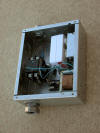
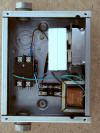

Images of my X10 water heater controller
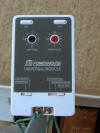
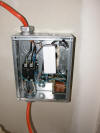
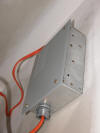
One additional expenditure I recommend - a wireless hand controller. If
you want to turn on a light or the water heater you really do not want to hook
up the computer to the PC USB Interface! For about $4 you can get an
X10 Palm Pad
Remote Control HR12A that will communicate with the PC USB Interface,
allowing you the ability to manually turn on or off devices under X10 control.
The Future of the Fansler House Hold
I have only begun to scratch the surface of what X10 can do. There are
additional software plugin modules for ActiveHome Pro that allow it to act as an
alarm system, mimic your daily routine for you, or even control and record
cameras. The cameras you can view over the Internet, Hardware I plan
on adding includes dimmers - at the press of one button all the lights in a room
can dim to a preset brightness for watching a movie or having a romantic
evening.
As previously noted, eBay is a good source of X10 supplies. For general
information I recommend the SmartHome and
X10 websites. |